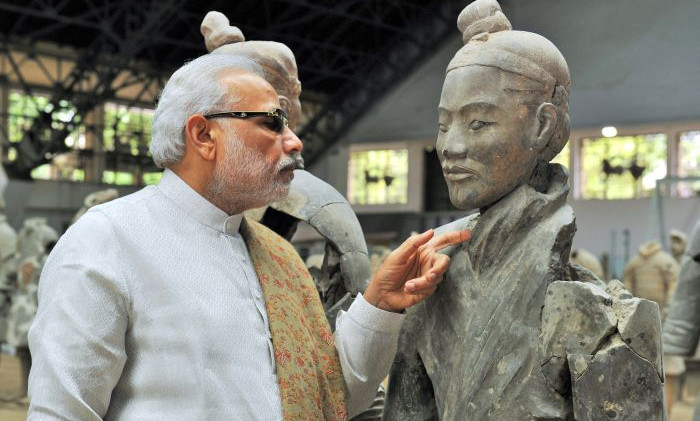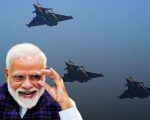India has quietly retreated from Doklam or Donglang area, a disputed Himalayan region on the border with China after a tense standoff bringing the two nuclear-armed neighbour to the brink of a war.
Since June, the two militaries stood eyeball to eyeball in Doklam plateau at the junction of India-China-Bhutan frontiers. Delhi mobilized the troops to prevent the construction of a road by Beijing on the territory disputed by Bhutan.
Both sides reached an agreement, the details of which have not been made public yet. It is unclear if the withdrawal of Indian troops is a condition to China’s shelving of the part of road project objected to by India and Bhutan. Regardless of the deal, the Modi government will claim a diplomatic win. A Chinese embassy spokesman in Pakistan tweeted Monday, “Indian soldiers have withdrawn. Chinese soldiers continue to patrol the area as per rules of historical boundary.”
The road along the eastern side of the Chumbi valley un-nerves India for the ridges overlook Siliguri Corridor (also called ‘the Chicken’s Neck’), the thin strip of land between Nepal, Bhutan and Bangladesh that connects India with its volatile northeastern part. Thus, Indian Army Chief General Bipin Rawat has rung the alarm bells of more similar stalemates with China. “My message to the troops is to not let down [their] guard.”

The notion of Indian exceptionalism
High tensions ahead between two populous members of the BRICS hint at the challenges ahead for the economic bloc whose top leaders are set to gather in Xiamen city on southern China on September 3. Delhi nearly jeopardized last year’s summit in Goa when it tried to hijack the moot’s final declaration and target Pakistan. The Modi government received a rude awakening from China and Russia, which refused to subscribe to its narrative, which had no bearing on the summit’s agenda and objectives.

Given increasingly hostile posturing of India against China on nearly every front along side the US, the future of BRICS seems far compromised than perceived. Notwithstanding its successful initiatives like New Development Bank or BRICS Bank, the organization is beset with multiple woes from macroeconomics to geopolitics.
India is deluded by its self-professed notion of global exceptionalism whereby it can sign defence agreements with the US to provide bases and logistical support for troops and hold maritime exercises while seeking access to Russian technology and the shared global market with China as its partner. With Narendra Modi at the helm, arrogance and coercion knows no bounds.
Be it BRICS or Shanghai Cooperation Organization (SCO), the fierce geostrategic contest between India and China undercuts both. Delhi’s military posturing as a regional hegemon on one hand, and sidekick of the United States, on the other, has a direct bearing on its allies such as Nepal, Bhutan and Bangladesh.

Already cosying up to China, Bhutan found its sovereignty challenged when Indian troops rushed to halt road construction in Doklam or Donglang region. Thimphu has every right to decide how to deal with its issues with other states. It has four territorial disputes with China but the recent one brought forth the ugly reality of a more assertive India whose troops did not wait for a nod from Bhutan before taking up the issue with its northern neighbour. Thimphu lay low as the dragon and the elephant stared at each other. Bhutanese dailies stated the events on the border sans editorialization. There is little doubt that China will give India a run for its money.
China has been making strenuous efforts to court Bangladesh too, much to the chagrin of India, which has predominantly used its weight to impress upon the southeastern neighbour. Modi-Hasina Wajid chumminess aside, China is selling Ming Class submarines to Bangladesh’s Navy. And that’s just the beginning of what may lurk in the Bay of Bengal dreading the blue water navy.

Additionally, China’s state-run Zhenhua Oil has inked a deal with Chevron to buy its major’s natural gas fields in Bangladesh amounting to over $2 billion. It’s not Delhi but Tokyo, which is bidding to lure Dhaka away from Beijing but with little success. In short, India’s status as a regional hegemon has so far been contested effectively.
Globally, India has conducted maritime drills with Japan and the US involving aircraft carriers and the related wherewithal. Export of BrahMos ramjet supersonic missile to Vietnamese Navy hint at Delhi’s increasing sphere of influence. However, China’s recent maritime exercises with Thailand while the Philippines tilt under President Rodrigo Duterte raises the stake of US and its Asian allies i.e. India and Japan.
The overhead of Hinduvisation
What happens in the South China Sea will have implications for India anywhere from Pangong Lake in Tibet to Doklam or Donglang area or the South Arabian Sea. If Delhi wants to be a partner through BRICS and SCO, the door is still wide open but the window of opportunity is assuredly shrinking. Already, Beijing has reminded Delhi of the rivers that originate on its soil but flow downstream without interference. If Indian media can be any guide, the message was well received, at least for the time being.
India’s historical memory aside, Narendra Modi who fantasizes himself as Mahabharata’s worrier king is in a hurry to cast the statecraft to his liking. Not just that he picked a junior general to command the Indian Army while superseding the most favourite candidates, he chose to give an extension to Ambassador S. Jaishankar for the appointment of foreign secretary in January 2015. The man then serving India’s envoy to the US was to retire a day later but now enjoys the third extension.
The seasoned diplomat shares Modi’s worldview. From his belief in Hindu mythology to diplomatic adventurism, everything pleases the Gujrat’s former chief minister. Saner diplomats in the south block may sound cautious but Modi’s Hindutva squad and their emotive followers won’t.
The outbreak of hostilities with China or Pakistan will certainly fuel ultra-nationalist sentiments favourable for Modi’s reelection lest they end in the colossal beating. With a weak and unimaginative opposition, the BJP government is living its dream of suppressing minorities and testing resolve of its rivals in the region. In the age of hybrid warfare, it’s not just Delhi’s military might on the borders or in the oceans but fissures within that make it susceptible.














